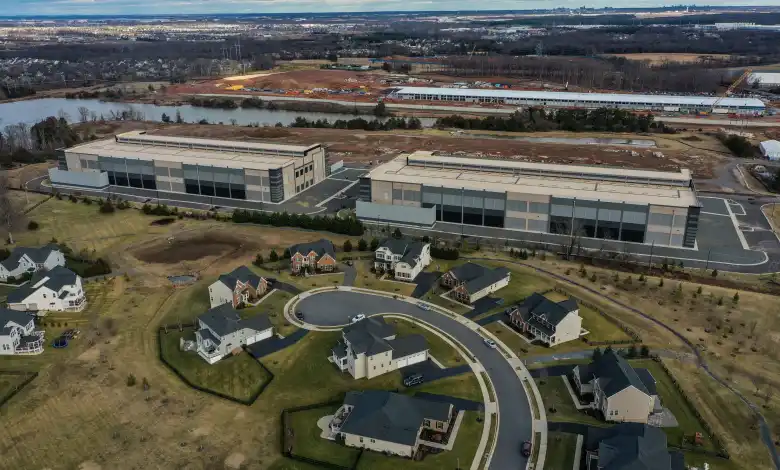Amazon data centers were built up to 50 feet from apartment buildings in the Loudoun Meadows neighborhood in Aldie, VA on what was previously farmland on January 20, 2023.
In January, the Oregon legislature introduced legislation aimed at reducing the carbon footprint of new data centers and cryptocurrency miners — facilities that have sprung up quickly in Oregon due to relatively low electricity costs and favorable tax incentives. It would have required new data centers and cryptocurrency mining facilities to run entirely on clean energy sources by 2040, in line with the state’s 2021 climate targets.
The bill, known as HB2816, died in a legislative committee on Monday. Supporters of the bill point to Amazon’s aggressive lobbying efforts. Amazon’s opposition to the clean energy measure contradicts its broader efforts to reduce its environmental impact. As part of its 2019 Climate Pledge, the company pledged to be carbon neutral by 2040. Amazon claims to be on track to use 100% renewable energy across its operations by 2025 and to be the largest corporate buyer of renewable energy.
“Amazon started organizing against this law from the moment we started talking about it,” said Oregon State Assemblywoman Pam Marsh, a co-sponsor of HB2816, in an interview.
Representatives from Oxley & Associates, an Amazon-hired lobbying firm, were seen in the Capitol halls speaking with members of the state Legislative Committee who would eventually hear the bill, according to Marsh, a DemocratData centers are extremely energy-intensive. According to the Department of Energy, US data centers consumed an estimated 70 billion kilowatt hours in 2014, or about 1.8% of total US electricity use that year.
Amazon relies on huge server farms to power its sprawling cloud computing service, which is the company’s main profit engine. Amazon has committed to powering all of its data centers with renewable energy, but has yet to fully divest from fossil fuels.
On Tuesday, Amazon announced that it has reached an agreement with Umatilla Electric Cooperative, the utility company that operates its operations in Umatilla and Morrow counties, Oregon, to select the power supply that powers its data centers, including from renewable sources.
Amazon also argues that lawmakers did not consult Oregon data center operators and owners when drafting the bill.
But Marsh denies that claim.
The committee removed a clause that imposed penalties on companies that failed to meet clean energy targets and added a provision that would allow them to opt out of the bill. Both actions are an attempt to generate goodwill, Marsh said.
“We said, ‘Okay, if it gets to 2030 and there’s been a major global disruption and you can’t meet your clean energy goals, you can file this filing and opt out because something might have happened that’s outside of your control .” Marsch said. “So we made good, strong changes to the bill, but it didn’t change Amazon’s opposition.”





